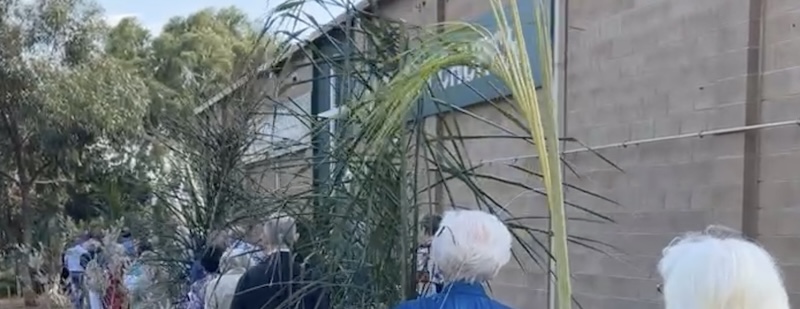This sermon was preached on the 13th of April 2025, the Palm Sunday, in the Anglican Parish of Kalamunda-Lesmurdie
Texts:
On Tuesday I spent lunchtime doing a bit of housework. I had some cups in the office that need to be washed by hand, so I ran the sink. Then I went outside to put the bins out, and got talking to someone in the courtyard.
Maybe ten minutes later, I walked back into the house, and remembered the tap… because I spent the next hour or so mopping up the water that was everywhere in the kitchen. Don’t worry, churchwardens, there was no major damage!
Forgetting is something that happens to all of us. We don’t even always know when we’ve forgotten. Sometimes, it’s only when we see the consequences of our forgetting that we realise what has happened.
And when we, as Christians, as the church, when we forget, the consequences are much worse than a slightly flooded kitchen… because when we forget, when we truly forget, we are forgetting Jesus Christ.
And so when we forget, we lose our understanding of our own dignity and worth. We forget that the world is grounded in absolute meaning, grounded in God. We forget that we bear God’s image within our soul. We forget that God loves us, with all that God is. We forget the call of Jesus: ‘follow me.’
When we forget, we indulge in judgement. We judge, and people – people who are made in God’s image, and who are precious in God’s sight – end up stranded and hurt, exiled far beyond the church.
When we forget, we care only for ourselves, or those closest to us… and so we neglect or even deride the hungry, the thirsty, the stranger; the naked, the sick, the imprisoned.
The consequences of forgetting are great. And yet, we are human. We will forget: and we won’t always know that we have forgotten.
“Do this in remembrance of me.” (Luke 22.19)
Those are the words Jesus spoke as he instituted the Eucharist, on the night of his arrest.
Jesus knew that we would forget.
And there’s a word the kind of forgetting I’m talking about – we get it from the Greek – amnesia. When you have amnesia, a memory is gone: and more than that, you might not even know you once had it at all.
And the word that Jesus used, the remedy that Jesus gave us that fateful night in Jerusalem, was ‘anamnesis.’ It’s the opposite of amnesia. It’s remembering, recalling. Our Bibles translate it as ‘remembrance’, but it’s much more than that.
It’s a putting back together: a re-member-ance, a putting back together of the Body, a putting back together of the Church. And this is what we do in Holy Week. We re-member.
We remember the triumphal procession into Jerusalem, Jesus processing in upon his steed, parodying the great Roman processions, with all their pomp and ceremony.
Jesus was a person with few possessions and no home, a man who often laid his head upon a stone to sleep, a man from disreputable Galilee. And it was this man who rode into Jerusalem as if he were some great official, or the emperor himself.
Who would dare to do that? And so of course the people, oppressed as they were, cried out in joy! Of course they rushed to palm trees and cut down fronds to wave about!
Today we have brought ourselves to that experience, and those events are now our collective now. And so we experience the jubilation of the arrival of the Messiah in Jerusalem, we experience crying out “Blessed is the One who comes in the Name of the Lord!” We have just cried out those words ourselves, we have embodied them. And so, we cease to forget: we remember.
Later in the week, we remember the last supper. We remember Jesus, God incarnate, kneeling and washing the feet of his friends. We remember the institution of the Eucharist. We remember the hospitality of God.
We remember also the betrayal of Judas, and we remember that we have the capacity to betray.
We remember the desertion by Peter, and remember that we too can be faithless.
We remember those who shouted for the Jesus to be put to death… and realise that some of those voices just days before had shouted his name in jubilation. We understand that we too could have done this.
But most importantly of all, we remember who Jesus is, who God is.
Jesus went to the Cross out of love for us.
Jesus took upon himself the worst of what we do to one another, the worst of human violence, the sum of human sin, of our rejection of God, and he died.
He died for us. Out of love. To ransom us from sin and death, to break open the doors of hell, to win for us release from bondage to evil.
This is our God. This is our God, glorious, wondrous, eternal. This is our God, Holy and Triune.
And so, remember!
Together, enter boldly into this week.
Together, be renewed: Renewed in faith, renewed in love, renewed in hope.
Together, marvel at the greatness of Jesus, the greatness of God with us, Emmanuel.
